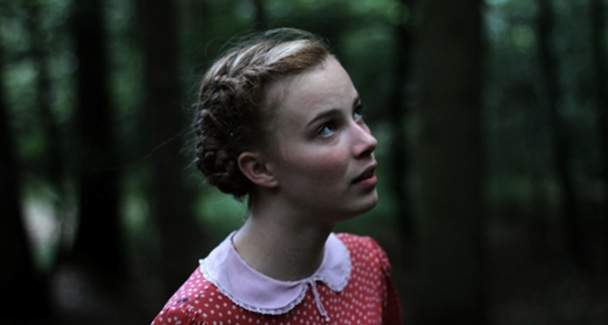Lore
From the director of Somersault comes a deeply affecting new film that's a counterpoint to the Von Trapps.
Overview
We take it as a given that children are innocent. But at what point do they stop being children and become knowing, culpable, or evil? This question is the backbone, though not the heart, of Lore, Cate Shortland's new film about naive Nazi offspring trying to cross Germany at the end of World War II.
The family of five kids is headed by Lore (star in the making Saskia Rosendahl), a girl of about 16, who, chasing her younger sister, Liesel (Nele Trebs), around the forest, looks like she could have skipped off a Hitler Youth propaganda poster. Their twin brothers are all chubby cheeks and short pants, and their baby brother is a doll. Their image should be angelic and instead constantly recalls the menace of the Nazi eugenics program orchestrated and implemented by their parents, who are imprisoned by the victorious Allies not long into the movie.
Abandoned and outcast, this inversion of the Von Trapps sets out for the refuge of their grandmother's house, 900km away in the north of Germany. The period directly after war is a lawless limbo, so the fact they are innocent children by no means guarantees their safety, and the things they see on their journey recall the apocalyptic nightmare of The Road. Eventually, they find some protection with Thomas (Kai Malina), a Jew who uses his papers to convince patrolling soldiers that the Aryans are his siblings.
Lore is disgusted by and cruel towards Thomas, but she also finds herself primally drawn to someone who is her ostensible enemy and yet has faced the same darkness that she has to hide from her younger siblings. The film tracks her slow, internal reckoning with the Nazi ideology she has swallowed in her upbringing. Her desire to feel, live, and know truth is the real heart of Lore.
Adapted from the novel The Dark Room by Rachel Seiffert, the Australian/British/German coproduction is a narrative well suited to Shortland, the Secret Life of Us director whose characteristic style made such a deep impression with her last film, 2004's Somersault. The focus is on sensation and saturation, the tempestuous and heightened reality of a broken world. Joining with cinematographer Adam Arkapaw (Animal Kingdom, Snowtown), she uses laconic storytelling and a languid lens to bring us the heady perspective of a character who doesn't wholly understand but does believe.
The result is deeply affecting and an inspiring choice for Australia's entry in the Best Foreign Language Film category for the 2013 Academy Awards. In these days when Godwin's Law reigns, it's not every day you see a Nazi tale so original and so piercing.





